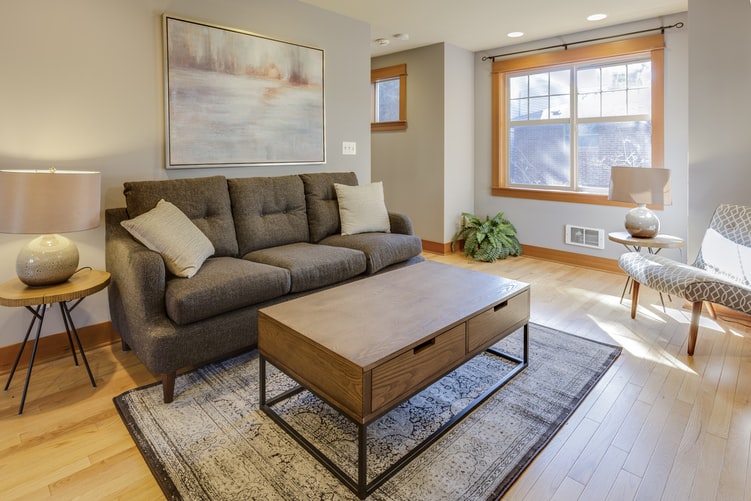Wellbeing & Wellness
Feng Shui: Top 10 Tips To De-Stress Decorating

Congratulations you conquered moving day! But… now what? So many rooms, so much to decorate, so much stress – no more! With the help of ancient Feng Shui, we can help you kick that moving stress and guide you in making your new house a home.
Feng Shui is the Chinese practice of decorating mindfully in order to improve wellbeing. We do this by increasing the flow of good energy, AKA Chi, throughout our living spaces. Its philosophy, stemming from the beautiful and ancient Taoism, aims to create a balance between our home and the natural world. When we move into a new house, it can often feel just like four walls and a roof. It can lack cohesion. Feng Shui is an excellent way to create that harmony: for you, your home, and the world outside all at once.
Rearrange Your Furniture ASAP
When we move into a new home, it is often arranged how the the previous landlord or owner had it. This means that their energy is often left lingering around. Simply nudging things around and shifting placements can really help in making it ours. According to Feng Shui, one should arrange their furniture in such a way that it allows for the flow of Chi: positive energy. Here are a few pointers to get you started:
- Arrange sofa sets, chairs and recliners in a U-shaped structure to promote conversation and community.
- Rooms that we spend a lot of time in, such as the living room, should have higher ceilings. Smaller ceilings can feel compressing and claustrophobic and inhibit growth and flow of energy. Be mindful when choosing which room will serve which purpose.
- Big, bright windows! Less, or smaller, windows negatively impact our social interaction. It also limits natural light in your home, which can contribute to low mood.
- Furniture behind your sofa, such as an end table or a cabinet, gives us a feeling of safety and support. Walls serve the same purpose. Similarly, it’s important that you are supported in bed: a decent headboard is essential.
- When placing your bed, ensure that you can still see the doorway without being directly in front of it. Feng Shui suggests being diagonal to the entrance of the room, consider a ‘command position’ because it is the optimal position in which to maximise the flow of Chi. If you cannot see the door from your bed, it may disturb your sleep or sense of peace. We are our most vulnerable in our bed and being blind to entrances and exits can exacerbate this dramatically.
- Don’t hang things above your bed! The threat of it falling alone can disturb Chi and distress us immensely. You never want to feel anxious or at risk in vulnerable places of rest and comfort.

Display Childhood Memories
Everyone has mementos from childhood: whether its an ancient teddy bear that you’ve hugged all the fluff off of or a series of mildly embarrassing baby photos; displaying these where you can see them brings a sense of nostalgia and belonging that can help make your house a home. We at Clooper believe family and community makes the world go round, and many principles of Feng Shui align with our beliefs as well.
According to Feng Shui, family photos especially strengthen familial bonds and bring the security of a family unit to the home. This is especially beneficial if you live alone. Try to place these photos in areas that your family and friends will frequent: kitchens are recommended alongside living and dining rooms to encourage abundance, nourishment and nurturing for you and your family within your new home.
- Include smiling faces: seeing your loved ones at their happiest will in turn boost your mood!
- Wedding photos are encouraged to be displayed in the family or living room, alongside the southwest wall. Wedding photos are especially helpful in cementing that feeling of homeliness and can be a happy reminder of how far you’ve come as a couple.
- If you have a staircase, hang family photos here. This can carry the positive Chi that these photographs and happy memories bring from downstairs through to upstairs: resonating all through the house.
- Tabletop photos on a dining table can foster love and community when you host family and friends for meals and festivities.
Dabble In Gardening
People often forget that homeliness extends outside of the four walls we live in, but don’t neglect that garden! Not only does planting and tending to your own crops or flowers boost that sense of belonging; this year, the Royal Horticultural Society recently surveyed more than 6000 people and found that those who garden every day have stress levels that are 4.2% lower than people who don’t garden at all.
On the Feng Shui side of things, experts advise that you allow for earth natural flow when placing paths or decorations. Curving pathways, flowing shapes and water features come highly recommended. These will allow Chi to flow smoothly and unobstructed, as nature intended.

Rugs And Carpets
Another often overlooked decoration is flooring. With something as simple as a bright, vibrant rug greeting you as you walk through the door, you can begin to foster that feeling of coming home. It will also bring you comfort if your flooring is softer, making that morning coffee that much happier.
Feng Shui tells us that greeting rugs are particularly important: a small rug by the front door helps to define the entryway and creates a space for a gateway between outdoors and indoors. Also consider rectangular rugs that frame conversational areas, such as beneath side tables and chairs, to maximize that warm communal feeling of home.
Rugs can also be a phenomenal starting piece to base colour schemes off of. Colours and their ties to the elements are very important in Feng Shui.
We’ve taken the time to detail a few basics to inspire your colour schemes while decorating your new home:
- RED: Stimulating, passion inspiring.
- ORANGE: Uplifting, promotes happiness and laughter.
- YELLOW: Wisdom and power of the self, good health, patience and understanding.
- GREEN: New beginnings and growth, associated with the element of wood, healing and freshness.
- TURQUOISES: Youthfulness, new beginnings and self-confidence.
- BLUE: Wisdom and introspection. Be advised: it is also a mourning colour in ancient Chinese culture. Be aware of this when decorating with deeper and darker blues especially!
- PURPLE: This colour inspires adventure, prosperity and spirituality.
- PINK: Inspires love, partnership and romance.
- BROWN: A colour associated with stability, security and safety. Very comforting in living and dining rooms especially.
- WHITE: Communication, clear thinking and precision. We recommend whites, blacks and greys for office spaces or studies for maximum effect!
- GREY: Represents teamwork, helpfulness and harmony because of its mixture of black and white.
- BLACK: Inspires contemplation, self reflection and reflection and mystery.
Lighting
Light, as Feng Shui teaches us, is the physical manifestation of the sun itself. It also produces warmth and heat, which is another form of energy highly beneficial to us as humans. A home that is too dark will be too compressive and can inspire laziness, whereas a too bright house can feel clinical and anxiety-inducing.
Here are some tips to getting the lighting balance just right in your new home:
- Brighten up dark corners with floor lamps. Torchiere lamps are great for this placement, as the light reaches all the way to the ceiling and is reflected back throughout the room.
- Keep your entrances well lit. Lights on either side of the front and back doors are excellent ways to draw positive energy inside. Make sure to keep on top of changing the bulbs, though, as burnt out bulbs will do the exact opposite!
- Avoid huge, harsh shadows cast by lighting. Feng Shui teaches us that light should illuminate, not further darken an area. This can also bring down the mood of a room considerably.
- Avoid lighting directly above your bed! Soft lighting in the bedroom is essential as this room is dedicated to rest, but lights directly over the bed are particularly abrasive and inauspicious and should be avoided. Save the brighter lights for living areas, not resting areas.

Organize Your Storage
Having our own storage, such as a pantry, can work wonders in allowing for a better flow of Chi. With everything scattered and unorganized, the dreaded clutter can build up quickly and further anxiety.
Clutter is also a huge no-no in Feng Shui, as it scrambles up the flow of Chi and can stress and perplex us to have around. Here are some storage tips to help negate these negative effects:
- If you have a room spare, invest in a pantry. I have personally found it helps to be more environmentally friendly. Twice a month when I do my shop, I empty many perishables into various labelled jars and containers, and find myself left with a haul of recycling. This makes it easier, and more convenient, for me to take trips to the recycling bins on specific days and keep on top of my waste output. Also, jars help many perishables stay fresh for longer. Wins all around! For more tips on waste management, see our previous blog post here.
- Don’t store things overhead if you can help it – overhead storage can contribute to feelings of anxiety and overwhelm. Shelves over doors and above beds and desks have a similar effect and can also induce headaches for obvious reasons.
- Vinyl-coated wire shelves that attach to doors can be an excellent way to organise smaller items, such as spices. Make sure that your door is not constricted by them (ie they still open fully) as to allow for beneficial energy flow. Also ensure to only use them on closet or pantry doors.
- With shelving, avoid visual overwhelm, and rotate items every few months to avoid stagnation. This also means you can revisit old favourites every now and again, which will foster a further appreciation for them.
- Match storage to décor: don’t just cram objects into cardboard boxes and forget about them, which I myself was guilty of for a long time. Many supermarkets stock storage boxes of varying sizes and styles, and you’ll find that matching decor to room ‘themes’ will achieve more of a feeling of togetherness and therefore, belonging. It’s important to note that although Feng Shui offers us tips and a guide to theming our living areas, ultimately it is your aesthetic that is most important and will be most efficient at fostering a positive flow of Chi. You are happiest in your own, personal space after all.
Hang Up Art
Even better if it’s your own or the art of a loved one: just make sure it matches the rest of the interior! Avoid colour schemes and style clashes that will upset the energy flow of your home. Feng Shui recommends that we feature certain elements and objects in our paintings to encourage flow, and negate overwhelm or negative emotions. For example:
- Paintings of bamboo and bamboo shoots encourage luck and prosperous energy.
- Gorgeous scenery, happy celebrations or festivities can bring a sense of peace and community to your home. Paintings of celebrations are most beneficial specifically in the living or dining room AKA wherever people will congregate most, and often. Happy memories bring happy energy.
- Paintings that you love! The most important thing here is you: your home, your art, your decision. If you surround yourself with art that you love and that inspires you, you’ll find yourself happier for it.
It is noted to avoid paintings of sad subject matter, though. This can negate the positive effects, even if you love the painting at first. Images of storms, war imagery, natural disasters and paintings that portray unhappy people and expressions are encouraged to be avoided in favour of more positive imagery.

Mirrors
Mirrors open up your area, bounce light into rooms and make them seem bigger and brighter. Strategically placed mirrors can also raise the energy in a room. If you position a large mirror opposite a window through to your garden, for example, it will reflect the beauty of nature into the house itself. Feng Shui encourages this also, to allow the Chi of the natural world to flow through your home.
Top Feng Shui Tip: Hanging mirrors in the living and dining rooms works especially to foster positive Chi, as this represents a bountiful wealth. Not only of money, however, but a wealth of family, community, and love.
Mans Best Friend
A house is a home when it is full of love and life. We suggest bringing in a pet to boost that energy. Pets will really amp up that feeling of coming home, knowing a loving friend will always greet you at the door.
If you work from home (and your landlord allows, if you have one) a dog or a cat work wonders. For those who are often out and about, perhaps fish, or even an outdoor cat. Feng Shui teaches that pets even have their own individual perks depending on the species:
- Cats and fish bring wealth.
- Birds symbolise success and wisdom.
- Dogs are incredible for infusing homes with liveliness, known in Feng Shui as Yang energy.
- Turtles are symbolic of longevity and endurance.
Remember though, our pets must be cared for and thriving to properly aid in making our house a home. Pets are for life, not just for new property ventures!

Indoor Plants
Plants are essential in strengthening the ‘wood’ energy of our homes. In Feng Shui, the energy of wood brings growth, kindness, compassion and stability into your new home. Green is also associated with healing and health, which is also apt for us here at Clooper!
While there are no real ‘good’ or ‘bad’ plants for Feng Shui, there are a few tips. So, for example, spiky cactuses aren’t advisable for beginners. Their spikes are abrasive and foster negative energy, making them difficult for beginners.
Here are a few of my personal recommendations for plants to spruce up your new home:
- Boston Ferns. These are incredibly easy to care for indoors and make perfect starter plants for those with little to no experience.
- Jade. This plant is incredibly beautiful and rumoured to be incredibly lucky. We recommend that someone else buy you this plant, however, as luck is best wished – not bought!
- Bamboo! As stated earlier, bamboo is a significant symbol in Feng Shui because it fosters prosperity and luck. It’s happy in water or soil and incredibly easy for beginners to care for.
- Golden Pothos. This is also an extremely easy to care for plant and its heart-shaped leaves make it very popular for aesthetic reasons. Not only is it simple and gorgeous, it’s also excellent for keeping your indoor air clean, and even help eliminate odors!
- Orchids. A popular plant, these are symbols of creativity and fertility, and can encourage passion in the household. They are also stunningly beautiful and similar to the Pothos and many other plants, can improve air quality within your home.
National Geographic delves into more details about Feng Shui’s origins and terminology for those who are interested in learning more here.
Looking for a new home to decorate? Start your search here.




